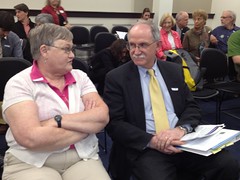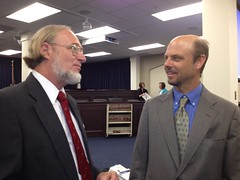Yesterday supporters of Kentucky's Clean Energy Opportunity Act came to Frankfort for a hearing on the bill. It was standing room only, and the conversation was lively. Kentucky Sustainable Energy Alliance (KySEA) member Lisa Abbott reported on the hearing on KFTC's blog
by Lisa Abbott for Kentuckians for the Commonwealth
Legislators heard testimony today about the benefits of the Clean Energy Opportunity Act (HB 167) during a hearing before the House Tourism Development and Energy Committee. KFTC members and our allies in the Kentucky Sustainable Energy Alliance have made HB 167 a high priority, and many were on hand in the packed committee room to show support. Although no vote was taken, the hearing was an important opportunity to inform legislators and build support for the future.
Bill sponsor Rep. Mary Lou Marzian introduced the bill, noting, "Thank you for allowing us to bring this important issue for discussion. This is a piece of legislation about job creation in Kentucky. Twenty-nine other states have passed this kind of policy that is called a renewable and efficiency portfolio standard. These policies have been shown to stabilize rates and create jobs. And those would be jobs that could stay in Kentucky."

Rick Hornby of Synapse Energy Economics presented a summary of a report his firm recently did about the potential economic impact of HB 167 on jobs and electricity rates in Kentucky over the next 10 years. "Kentucky is facing an electricity challenge. A number of utilities are looking at retrofitting some coal-fired plants. Some are planning to retire coal plants. Some of those retirements will be replaced with new generation, largely natural gas. Our study projects that Kentucky is looking at increases in average electricity supply costs on the order of 50%. Adding renewable energy and energy efficiency to your mix will help Kentucky turn this challenge into an opportunity. As I say, it will help. There is no silver bullet."
Hornby touched on several highlights of the Synapse report, including:
- The energy efficiency and renewable energy requirements contained in HB 167 could generate 28,000 net new jobs over the next 10 years.
- Under any scenario – whether this bill passes or it doesn't – utility rates in Kentucky are going to go up significantly.
- Average electric bills in Kentucky are projected to be 8-10% lower at the end of 10 years as a result of HB 167 than they would be under a business-as-usual scenario.
Chris Woolery, who works with the Mountain Association for Community Economic Development (MACED), also testified in support of the measure. "I'm one of those contractors that could definitely have benefited from legislation like this. As a former Energy Star home-builder, I learned about the importance of energy efficiency. Then when the market crashed I went into energy retrofit work."
Woolery described his job doing home energy audits and retrofits in eastern Kentucky. "I'm now working with How$mart Kentucky. We work with four rural electric co-operatives in eastern Kentucky to do on-bill financing for energy improvements. With these co-ops we do whole house audits and energy upgrades, and we create a savings that the customer uses to pay for the improvements."
Woolery described some of the results of the How$mart program in the past year:
- reached customers in 23 counties.
- retrofitted 57 houses.
- saving people 25-37% on their bills.
- savings of $550 per year on average per family.
Over 40% of the families the program has worked with are low to moderate income.
 David Brown Kinloch, a renewable energy developer in Kentucky, also spoke before the committee. He emphasized the importance of a portion of the bill – called a feed-in tariff – that is designed to spur investment in renewable energy projects. "A feed-in tariff will allow companies like mine to finance projects and sell power into the grid here in Kentucky. There is tremendous opportunity in Kentucky, and this bill just allows that opportunity to be harvested."
David Brown Kinloch, a renewable energy developer in Kentucky, also spoke before the committee. He emphasized the importance of a portion of the bill – called a feed-in tariff – that is designed to spur investment in renewable energy projects. "A feed-in tariff will allow companies like mine to finance projects and sell power into the grid here in Kentucky. There is tremendous opportunity in Kentucky, and this bill just allows that opportunity to be harvested."
The testimony generated a number of comments and questions from members of the Tourism Development and Energy Committee. Chairwoman Leslie Combs from Pike County voiced concern about the troubling projections that utility rates are projected to rise steeply under any scenario.
"Consumers are consistently concerned about the fact that their rates are going up, today," she stated. "They don't want their rates to go up any more, and if anything they would like them to come down. But according to this chart, under any scenario, the rates go up. Period. I realize that's kind of the way things are, but at the same time it's hard to explain to the consumers who are saying, 'stop raising our rates.'
Hornby acknowledged that difficult reality. "I very much understand. It would be nice to be able to come in and say that. But the numbers are the numbers. Kentucky has a big challenge. Over the next several years, no matter what, your rates are going to go up by some amount. What efficiency and renewables can do is give your ratepayers some ability to respond to those increases. If you use less, your bill won't go up as much even as rates rise, and we are going to help you use less."
Rep. Keith Hall from Pike County concluded the testimony on HB 167 with a note of praise. "I want to commend Rep. Marzian for bringing this measure before the committee. And to the gentleman who spoke about energy efficiency, that's a very good program. This has been a very worthwhile conversation, and I want to commend the Madam Chairperson for having it."
For video of the full testimony, see KFTC's website.





